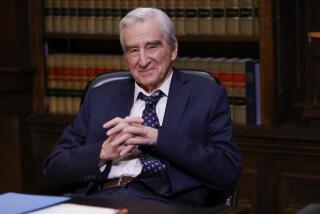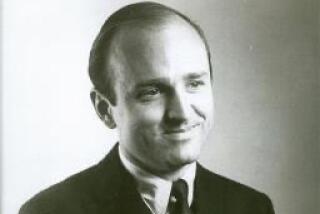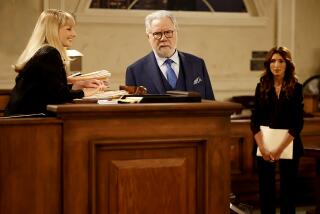H. Brodkin, 77; Produced Top Shows for TV
- Share via
Herbert Brodkin, the craggy-faced, fiercely independent producer who opted to remain in New York when most of the television industry moved West and who was responsible for some of the finest programming in TV history, is dead.
He died Monday at Mt. Sinai Hospital in New York City of an aneurysm, the Associated Press reported Wednesday. Brodkin was 77.
With John Houseman and Fred Coe he was one of the rotating trio of producers who crafted the final years of “Playhouse 90,” and when that fabled series was canceled by CBS he turned to provocative and innovative specials.
They included programs on such sensitive issues as Nazism, nuclear war, bigotry, medical malpractice and the Holocaust.
Many were breakthrough programs, dealing with subjects long considered taboo by network executives.
He and Reginald Rose created and produced the heralded “The Defenders,” which many critics still rank with the finest weekly series in television history.
The series of courtroom dramas became a focal point for social issues in the brief (1961-65) period it was on the air, addressing such topics as mercy killing, abortion and a government’s right to restrict the travel of its citizens.
The series won more than two dozen Emmys.
Centered on a father-and-son law firm, the series was an outgrowth of a “Studio One” special. “Studio One” was another highly regarded series which Brodkin directed.
Brodkin came to be known as an individualist in the corporate boardrooms of network executives. His favorite admonition to them was, “The trouble is that you gentlemen think of television as a business; I think of it as an art.”
He was indignant when live TV drama was replaced by film, claiming that “we were well on our way to creating a new art form.”
Brodkin, who began as a set designer after graduating from the Yale Drama School, personally collared critics when CBS chief James Aubrey pulled “Playhouse 90” off the air in 1961, demanding that they do something about it.
At that point he had been in Los Angeles for the final few shows with Houseman and Coe but thereafter went back to New York, never to return.
There he produced “Judgment at Nuremberg” and was incensed when the sponsoring gas company blotted out references to the gas ovens in the Nazi death camps. He produced “Holocaust” in 1978, which earned the then second-highest ratings numbers in A.C. Nielsen history, and “Skokie” in 1981, about attempts to prevent Nazi demonstrations.
More recently his Titus Productions Inc. turned out specials on two international humanists, “Sakharov” in 1984 and “Mandela” in 1987.
He also developed what he called his own version of Murphy’s Law--”Whenever a network can destroy anything, it will.”
Survivors include two daughters and two sisters.
More to Read
The complete guide to home viewing
Get Screen Gab for everything about the TV shows and streaming movies everyone’s talking about.
You may occasionally receive promotional content from the Los Angeles Times.






